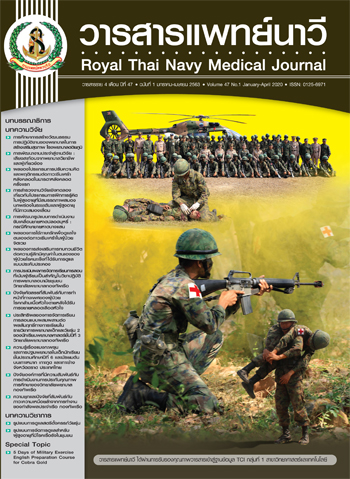Developing a Routine to Research : Voices of Professional Nurses and Key Stakeholders
Main Article Content
Abstract
The purpose of this study was to describe methods in developing a routine to research by professional nurses and key stakeholders. Heidegger’s hermeneutic phenomenology was applied for this study. Study participants were 12 professional nurses, a chief division of nursing quality development and standard, 3 head nurses, and 3 statistical and research consultants. In-depth interviews with tape-recordings, observation and field notes were used for data collection. Data were analyzed using content analysis of van Manen’s method.
The study’s findings fell into six major themes as follows: 1. The R2R policy brought into practice consisted of two sub-themes as follows: 1.1) Head nurses assigned nurses to do R2R; and 1.2) Nurses volunteered to conduct R2R. 2. Identifying research consisted of three sub-themes as follows: 2.1) Improving unsatisfied service to be better; 2.2) Developing innovation to support nursing care and 2.3) Completing the recording system. 3. Finding team members consisted of two sub-themes as follows: 3.1) Assigning nurses to be a member; and 3.2) Nurses volunteered to be a member. 4. Steps of R2R process consisted of nine sub-themes as follows: 4.1) Writing research proposal; 4.2) Submitting proposal to reviewer; 4.3) Proposing a project to Institute Review Board; 4.4) Withdrawing budget from research grants; 4.5) Explaining next step on staff cooperation; 4.6) Implementing research protocol and data collection; 4.7) Analyzing research data; 4.8) Submitting a report for final budget; and 4.9) Disseminating research to both national and international public. 5. Outcome from the success of R2R consisted of two sub-themes as follows: 5.1) Improving the quality of nursing service; and 5.2) Being proud of self to complete research. 6. Several supports leading to R2R success consisted of six sub-themes as follows: 6.1) Building inspiration to conduct R2R; 6.2) Concentrating on R2R; 6.3) Managing time for R2R; 6.4) Working as an effective team; 6.5) Giving full support to R2R by a head nurse; and 6.6) Having hospital strategies that lead to R2R projects.
Article Details

This work is licensed under a Creative Commons Attribution-NonCommercial-NoDerivatives 4.0 International License.
References
2. Chaikongkiat P, Khamkong M. Research from routine work: driving towards utilization. Journal of Nursing College Network and Southern Public Health 2017;4(3):259-70. (in Thai).
3. Chimchalong R. Nursing quality development in tertiary hospitals that have been passed the hospital accreditation. [Master’s Thesis, Faculty of Nursing]. Chulalongkorn University; 2008. (in Thai).
4. Limlamai P. Evaluation of nursing service quality development project: Routine to Research Nursing Department Chao Phraya Yommarat Hospital, Suphanburi province. Journal of Nursing Division 2009;36(3):133-45. (in Thai).
5. Rojanaacha R. Evaluation of routine projects for research work of Sadao Hospital personnel. Journal of Nursing College Network and Southern Public Health 2016;3(2):133-48. (in Thai).
6. Premprani P. Factors influencing the development of routine work in research work of professional nurses in hospitals under the Department of Medical Services Ministry of Public Health Bangkok. [Master's Thesis, Faculty of Nursing]. Sukhothai Thammathirat Open University; 2008. (in Thai).
7. Research Division and Agricultural Extension Development. Decode routine to research. [Internet]. [cited 2018 October 10]. Available from: http://new.research.doae.go.th/R2R/R2R.pdf. (in Thai).
8. Oumtanee A. Qualitative research in nursing. 3rd ed. Bangkok: Chulalongkorn University Printing House; 2016. (in Thai).
9. van Manen M. Researching lived experience. Canada: The Arthouses Press; 1990.
10. Viranan V. Factors influencing research competencies of professional nurses’ community Hospital Public Health Inspection Area 17. [Master's Thesis, Faculty of Nursing]. Sukhothai Thammathirat Open University; 2012. (in Thai).
11. Watjinda A. Assignment. [Internet]. [cited 2019 June 2]. Available from: https:// www.hrcenter.co.th/file/columns/hr_f_20170510_172037.pdf. (in Thai).
12. Upamai P. Empowering teams based on sufficiency economy principles. Nonthaburi: National Printing Technology Training Center, Sukhothai Thammathirat Open University; 2008. (in Thai).
13. Kaewmeesri B. Presentation of the development of leadership characteristics of the Administrators College of Nursing under the Ministry of Public Health. [Doctoral Dissertations, Faculty of Nursing]. Chulalongkorn University; 2002. (in Thai).
14. National Research Council of Thailand. Research ethics guidelines National Research Council. [Internet]. [cited 2019 June 21]. Available from: http://www.lerson.sc.chula.ac.th/ bc/pdf/ethics/NRCT_1998_Researcher_Ethics.pdf. (in Thai).
15. Chittanan B. Social science research. 2nd ed. Bangkok: Kasetsart University; 1997. (in Thai).
16. Pingsanoi W. Factors influencing the research of academic personnel health science group Thammasat University. [Master’s Thesis, Faculty of Industrial Education]. Rajamangala University of Technology Thanyaburi; 2013. (in Thai).
17. Chantarasena B, Kanatou, M. Factors affecting academic research public health that working under the Public Health Office Nongbua Lamphu Province. Journal of Community Health Development Quartery Khonkaen University 2014;2(3):321-35. (in Thai).
18. Srikanok W. Nursing practice to research. Journal of Royal Thai Army Nursing 2014; 15(2):15-22. (in Thai).
19. Kaewchamnong A. Principles of management. 2nd ed. Songkhla: Thaksin University; 2007. (in Thai).
20. Wanitchayawattanakun S. Motivation and motivation. [Internet]. [cited 2019 June 22]. Available from: http://www.novabizz.com/NovaAce/Motives.htm. (in Thai).
21. Wonganutaroj P. Psychology of personnel management. Bangkok: Supplementary Media Center Bangkok; 2010. (in Thai).
22. Onyam W. Factors affecting the development of research potential from routine work of the International College Staff Mahidol University. [Master's Thesis, Faculty of Management Science]. Silpakorn University; 2009. (in Thai).
23. Sriprom T. Analysis of causal factors that influence motivation in researching of Rajabhat University teachers in the upper northern region. Kasalong Kham Research Journal 2011;5(2):6-15. (in Thai).


